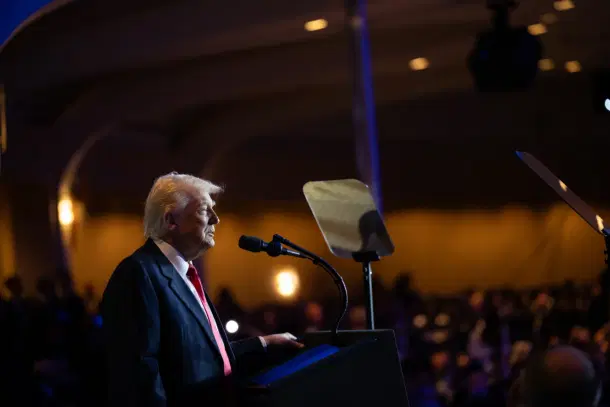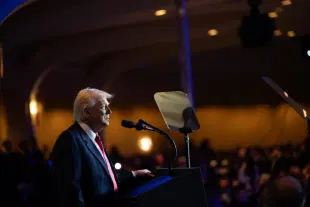World
Trump’s Ukraine Pivot: What It Means For Europe’s Future
Jai Menon
Feb 20, 2025, 06:04 PM | Updated 06:08 PM IST
Save & read from anywhere!
Bookmark stories for easy access on any device or the Swarajya app.


A turning point has been reached over Ukraine. Here are some observations on what can be expected to unfold during the Trump administration, which has just commenced.
The Trump presidency has already made it clear that America’s role in this confrontation between the North Atlantic Treaty Organization (NATO) and Russia is over. The Europeans are taking their time to digest this reality, judging by the noises coming out of their capitals and Brussels, but they will do so and the sooner, the better for them.
To help them grasp the new reality, Trump dispatched Vice President J D Vance, Foreign Secretary Marco Rubio, Defense Secretary Pete Hegseth, and Special Envoy for Ukraine General Keith Kellogg. The facts of life, going forward, were asserted with zero diplomatic lubrication:
1. Direct talks with Russia will happen soon over Ukraine and various other matters of global importance between President Donald Trump and Russian President Vladimir Putin. Talks have already happened in Saudi Arabia between Foreign Minister Sergei Lavrov and Secretary of State Marco Rubio. Europe, at least initially, will have no role in it. Nor will Ukraine.
2. Signalling a 180-degree shift in the United States' (US) position, Trump has bluntly stated, “I see that Putin wants to stop the fighting in Ukraine,” and on suggestions that there would be a threat to NATO from Russia, dismissed it: “I don’t agree even a little bit.” Quite some way from the mantra of “unprovoked aggression” by Russia that the rest of the world meditated on for the last three years.
3. Secretary Hegseth, a military man himself, pointed out at a NATO press conference: “You can’t shoot values” — that is, Europe does not have “hard power” and should now put up hard cash to bolster NATO and take care of their own defences. The Europeans have begun pondering loudly about what this will really mean.
4. Vice President Vance, though, was the one who really got on European nerves when he called out democratic backsliding. For a few days, the news media on the continent could talk of nothing else but Vance’s arrogance and lecturing, likely having missed out on the calculated brutality of General Kellogg’s comments at the Munich Security Conference.
Some sympathy is due for the continental Europeans (the members of the European Union in particular, especially their publics). They have no one else but themselves to blame for the predicament they find themselves in. They have not read the room right for at least two decades.
Granted, they were railroaded into a post-Cold War Great Game confrontation on the western Eurasian periphery that was really an Anglo-American project. They acquiesced in it partly due to an inability to process that “the West” is really two different spheres, the Anglosphere and the Eurosphere.
These spheres have distinctly different strategic considerations in the 21st century. The Europeans did not recognise that reality and were lulled into the fantasy of security by the NATO architecture and a mind-meld conditioned over decades.
(By way of explanation: The Anglosphere comprises the native English-speaking “island” states; that is, those separated from Eurasia by the Atlantic, the Pacific, and the English Channel. The Eurosphere broadly consists of what is known as the European Union, all of them European countries on the Eurasian landmass.)
The Eurosphere is now about to be abandoned to the consequences of the collapse of the Ukraine project, positive spins on it notwithstanding. The reality is that the Eurosphere is by far the junior partner to the Anglosphere. It was comfortable in this position through the Cold War for obvious reasons.
The Europeans were just recovering from the Second World War. A steadily expanding NATO superstructure, built overwhelmingly on an American military frame, provided security as well as a borrowed sense of immunity and, more dangerously, impunity.
It has taken the Eurosphere far too long to recognise the implications of that structural reality within the West. They got too comfortable with the Anglosphere, where the US is by far the first among equals in military terms, bearing the security burden in financial terms. Europe continued ignoring that reality after the collapse of the Soviet Union.
Instead of working to create a security architecture for Europe that would include Russia and containing the revived quasi-imperial notions of the Anglosphere, they joined in another quixotic “Charge of the Light Brigade” in Ukraine, sadly, considering the hundreds of thousands dead on both sides.
Once the dust has settled, and in the final analysis, it will emerge that Britain (basically its elite) had a far more insidious and leading role in originating, generating, and nurturing the Ukraine conflict than might seem obvious at present — the pitbull posing as a poodle.
Now that the Ukraine project has floundered, as predictable and predicted by many (including this writer here, here, here, and here), the Eurosphere’s own weaknesses are highlighted in stark relief. What comes next?
European input will have little real value in what looks like a done deal. US President Trump and Russian President Putin have already had a lengthy call, undoubtedly with prior preparation by their teams from before the US leader took office. Their leaders will have to sit this one out, for the most part. The alternative is to play spoiler, which may not work to their benefit either.
In effect, the Trump administration, deliberately or otherwise, has painfully highlighted the impotence of the Eurosphere. This is not likely to be taken lying down. What can the Eurosphere do to overcome their security predicament?
It is certain that they will all boost their defence budgets. What will become of NATO though, and will the Eurosphere move towards building up a collective security framework among themselves, independent of NATO over time?
These are two inevitable outcomes: (a) NATO will become weaker, less useful as an instrument of power to the US because the Europeans will themselves gradually begin to move towards strategic or military autonomy; and (b) the Eurosphere will slowly, unsteadily, move towards the creation of a continental European security architecture. It is only a question of how long the processes will take — and, ironically, what the Anglosphere will do to prevent that from happening.
Eurosphere cohesion can happen faster, and more durably, if the Europeans flip the script and reverse the prevailing narrative. For that to happen, they will have to outpace the Americans in making up with the Russians. This is possible, given the rapidity with which governments are falling and changing in Europe. US actions have opened up Europe’s options.
Germany, however, is key. The Alternative for Democracy (AfD), poised for a much better performance than any right-wing party after the Second World War, is capable of ending sanctions, reviving the Nordstream 2 pipeline, and normalising relations with Russia in parallel with Washington’s negotiations with Moscow.
In that case, the rest of the Europeans will have no choice but to follow, with varying degrees of reluctance, sooner or later. But the AfD’s prospects of forming or participating in a government are yet to be seen. Now there is a better chance than there has ever been.
It would be easier and certainly more valuable for stability over the long term if, in the interest of their collective security, key European states — Germany, France, Italy, Spain, the Netherlands, and Poland — discussed with Russia the outlines of a common security architecture.
This would include the interests of all parties involved and likely obviate another Ukraine-like situation cropping up. The Munich Security Council panel conversations of the past week did not give much room for optimism on this front.
But the times are changing rapidly and attitudes may prove to be more agile than the vocalised positions suggest. Ultimately, the Eurosphere will take steps towards developing its security future in a way that is markedly less dependent on the Anglosphere.
An EU citizen of Indian origin, Jai is based in East Africa and is a keen observer of Eurasian and South Asian developments.





